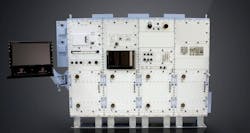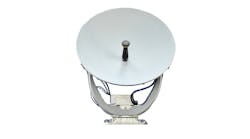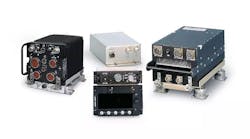LAKEHURST, N.J. – Test and measurement experts at Lockheed Martin Corp. will upgrade, maintain, and support U.S. Navy combat avionics test equipment under terms of a $71.3 million contract announced in March.
Officials of the Naval Air Warfare Center Aircraft Division in Lakehurst, N.J., are asking engineers at the Lockheed Martin Rotary and Mission Systems segment in Orlando, Fla., to provide performance-based logistics maintenance and support for Navy and allied Consolidated Automated Support System (CASS) avionics test stations.
CASS is one of the Navy’s standard automatic test equipment family supporting electronics on naval aircraft, and is designed to help avionics technicians to troubleshoot and repair aircraft assemblies at sea or ashore and return the avionics to service quickly.
CASS has been fielded on ships and ashore since the early 1990s. Lockheed Martin also offers a more modern version of CASS called electronic Consolidated Automated Support System (eCASS).
Lockheed Martin eCASS test equipment include radio frequency systems; self-maintenance and test calibration operational test program sets; calibration equipment kits; shore installation kits; ship installation kits; test program sets development suites; high-power mission equipment kits; and electro-optic mission equipment kits.
At its peak usage around 2000, CASS was the world's largest automated test support program, and was the Navy's standard test equipment for avionics on aircraft carriers and in depots throughout the U.S.
CASS production started in 1990 to replace specialized avionics testers at sea. When they were procured originally the CASS mainframes cost about $1 million each.
The test systems were designed with open-systems architectures to detect and isolate faults in avionics equipment on such carrier-based aircraft as the E-2C radar surveillance turboprop, EA-6B electronic warfare jet, F-14 jet fighter, F/A-18 fighter-bomber, AV-8B jump jet, S-3 surveillance jet, and SH-60 helicopter.
Prior to CASS this function required 25 separate old testers. CASS systems at sea are installed on all the Navy's aircraft carriers and most amphibious assault ships.
CASS units also are used at Navy and Marine Corps air stations. A variant known as Reconfigurable Transportable CASS (RTCASS) housed in portable shelters is designed to be sufficiently mobile for use by the Marine Corps in helicopter avionics testing.
Lockheed Martin delivered the first modernized eCASS station in late 2014 to support all the aircraft in the Navy’s fleet, including the F-35 Lightning II joint strike fighter.
On this contract Lockheed Martin will do the work at locations to be determined with each delivery, and should be finished by March 2031. For more information contact Lockheed Martin Rotary and Mission Systems online at www.lockheedmartin.com/en-us/who-we-are/business-areas/rotary-and-mission-systems.html.



